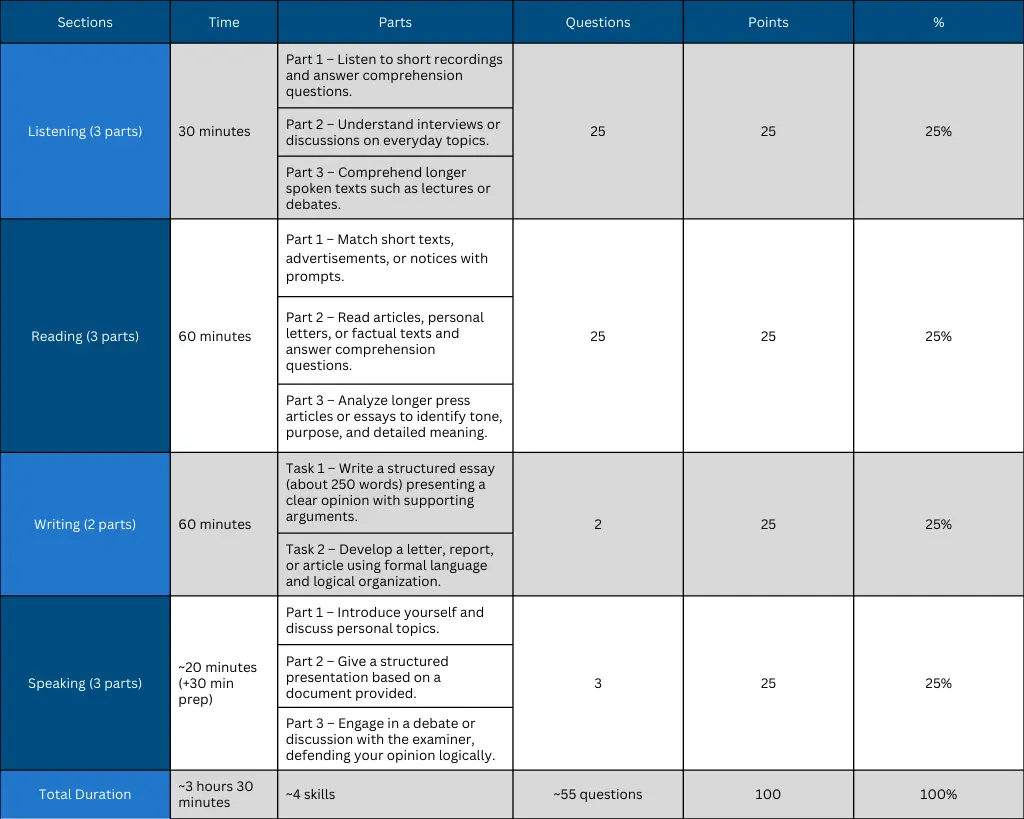A French exam is an official assessment designed to measure a learner’s ability to communicate effectively in the French language, covering skills such as reading, writing, listening, and speaking. Recognized worldwide, these exams serve as proof of proficiency for academic, professional, or personal purposes. Among the most popular certifications is the DELF B2 exam, which evaluates upper-intermediate learners who can handle complex texts, express opinions clearly, and engage in meaningful discussions. This level is often required for studying at French universities or applying for jobs in French-speaking environments, making it a valuable milestone for language learners.
French delf B2 Exam Structure

- This table explains the French DELF B2 exam structure, giving learners a clear overview of the delf b2 exam format across listening, reading, writing, and speaking.
- It integrates focused preparation tips that match the delf b2 exam format, ensuring candidates strengthen all four skills for better performance in the delf b2 exam.
Eligibility Criteria
- Age Requirement: The delf b2 exam is open to both teenagers and adults, typically recommended for learners aged 16 and above. This ensures that candidates have the maturity and language exposure needed to handle complex topics and structured arguments.
- Language Proficiency Level: Candidates are expected to have completed at least an intermediate level of French learning (around 400–600 study hours). Reviewing delf b2 exam papers can help learners assess whether their grammar, vocabulary, and comprehension meet the expected standard.
- Academic and Professional Aspirants: The delf b2 exam is particularly relevant for those aiming to study in French universities or apply for professional roles in French-speaking regions. Success at this level proves the ability to participate in academic discussions and workplace communication effectively.
- No Formal Prerequisite: There is no requirement to have passed earlier DELF levels before attempting B2. However, practice with delf b2 exam papers and guided preparation are highly recommended to build confidence and familiarity with the exam structure.
Exam Pattern – Detailed Structure
The delf b2 exam evaluates upper-intermediate communication skills across four sections: Listening, Reading, Writing, and Speaking. Each component of the delf b2 exam format is designed to assess how well candidates can understand complex information, form logical arguments, and interact confidently in academic or professional contexts.
Listening – 30 minutes | 3 parts | ~25 questions
Part 1: Candidates listen to short dialogues and answer multiple-choice questions, identifying key details such as tone, intent, or context.
Part 2: Recordings like interviews, discussions, or announcements are played, and test-takers analyze the speaker’s perspective or conclusion.
Part 3: A longer audio, such as a lecture or debate, is provided, requiring detailed comprehension and inference. Reviewing past recordings and practicing with authentic French audios can significantly improve performance.
Reading – 60 minutes | 3 parts | ~25 questions
Part 1: Match short written texts, advertisements, or notices with corresponding situations.
Part 2: Read structured texts such as letters, reports, or articles, then answer questions to check understanding of the purpose and meaning.
Part 3: Analyze complex documents like press extracts or essays, focusing on author intent, arguments, and detailed reasoning. Exposure to varied materials helps learners adapt to the delf b2 exam format.
Writing – 60 minutes | 2 tasks
Task 1: Write an essay of about 250 words, developing a clear opinion with arguments and counterarguments, for example discussing a social issue or cultural debate.
Task 2: Draft a structured letter, report, or article using formal language. Candidates are expected to present logical reasoning and appropriate register throughout. Practicing with structured outlines before the delf b2 exam registration process ensures readiness.
Speaking – 20 minutes | 3 parts
Part 1: Introduce yourself and respond to personal questions on studies, career, or experiences.
Part 2: Present a structured speech based on a provided document, followed by clarification questions from the examiner.
Part 3: Engage in a discussion or debate, defending your point of view on broader topics such as education, media, or cultural trends. Candidates are encouraged to use persuasive language and maintain fluency. Mock tests before delf b2 exam registration can boost confidence.
The delf b2 exam ensures learners are capable of independent thought, critical analysis, and effective communication in real-world situations, providing a strong foundation for higher studies or professional opportunities in French-speaking environments.
Passing Criteria
- Score Breakdown: The delf b2 exam is scored out of 100 points, with Listening, Reading, Writing, and Speaking each contributing 25 points. This equal distribution ensures candidates demonstrate balanced competence, preventing reliance on just one strong skill area.
- Passing Requirement: To succeed, candidates must achieve at least 50 points overall while also scoring a minimum of 5 points in each section. This structure guarantees consistent performance across all four skills, making practice with delf b2 exam papers essential for readiness.
- Evaluation Method: Examiners grade responses based on task completion, clarity, coherence, and accuracy. For example, in Writing, candidates are expected to present logical arguments in essays, while in Speaking, they must engage confidently in debates and structured discussions.
- Role of Listening Practice: The listening section is often challenging because recordings include real-life speed, diverse accents, and complex vocabulary. Regular exposure to delf b2 exam papers with listening tasks helps learners adapt and develop quick comprehension strategies.
- Balanced Preparation: Since all sections carry equal weight, test-takers must prepare holistically. Focused practice using previous delf b2 exam materials—covering reading comprehension, essay writing, and oral debates—ensures steady progress toward meeting the official passing criteria.
Conclusion
The delf b2 exam is a valuable certification that proves a learner’s ability to communicate effectively in French across academic, professional, and social contexts. It not only strengthens language confidence but also opens doors to studying at universities and working in French-speaking environments. With the right preparation and consistent practice, achieving success is entirely possible.
Read also: French Delf B1 Preparation

